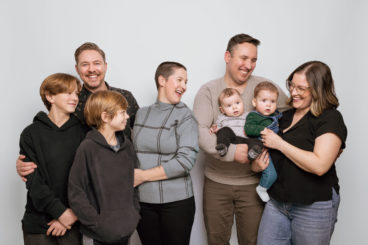
Meet the Parents
Alisha Rollinson underwent 10 rounds of fertility treatment and miscarried four times in four years. She was shattered, exhausted and losing hope when the unthinkable happened—twice
Five years ago, Alisha and Kyle Rollinson decided that they wanted to start a family. Alisha stopped taking birth control, and nine months later, she found out she was pregnant. The couple was thrilled. But, six weeks in, just before Alisha’s 30th birthday, she miscarried. They were heartbroken, but it was Alisha’s first pregnancy, and she just thought they’d try again. They soon realized that things weren’t going to be as easy as they thought. Here, a story about perseverance, friendship and the phenomenal power of family.
Alisha: Kyle and I kept trying for a year after my first miscarriage, but we still hadn’t gotten pregnant again, so we went to a fertility clinic for tests. We discovered that Kyle had a low sperm count, and our doctor recommended that I start intrauterine insemination, or IUI. I took medication that caused me to ovulate and received timed insertions of his sperm.
After one round of IUI, I became pregnant for the second time. I thought, Okay, that wasn’t so bad. But then, around six weeks in, I miscarried again. It was upsetting and harder to take than the first time. Still, I stayed positive. I thought, It happens. It was only our first treatment. Let’s try this again.
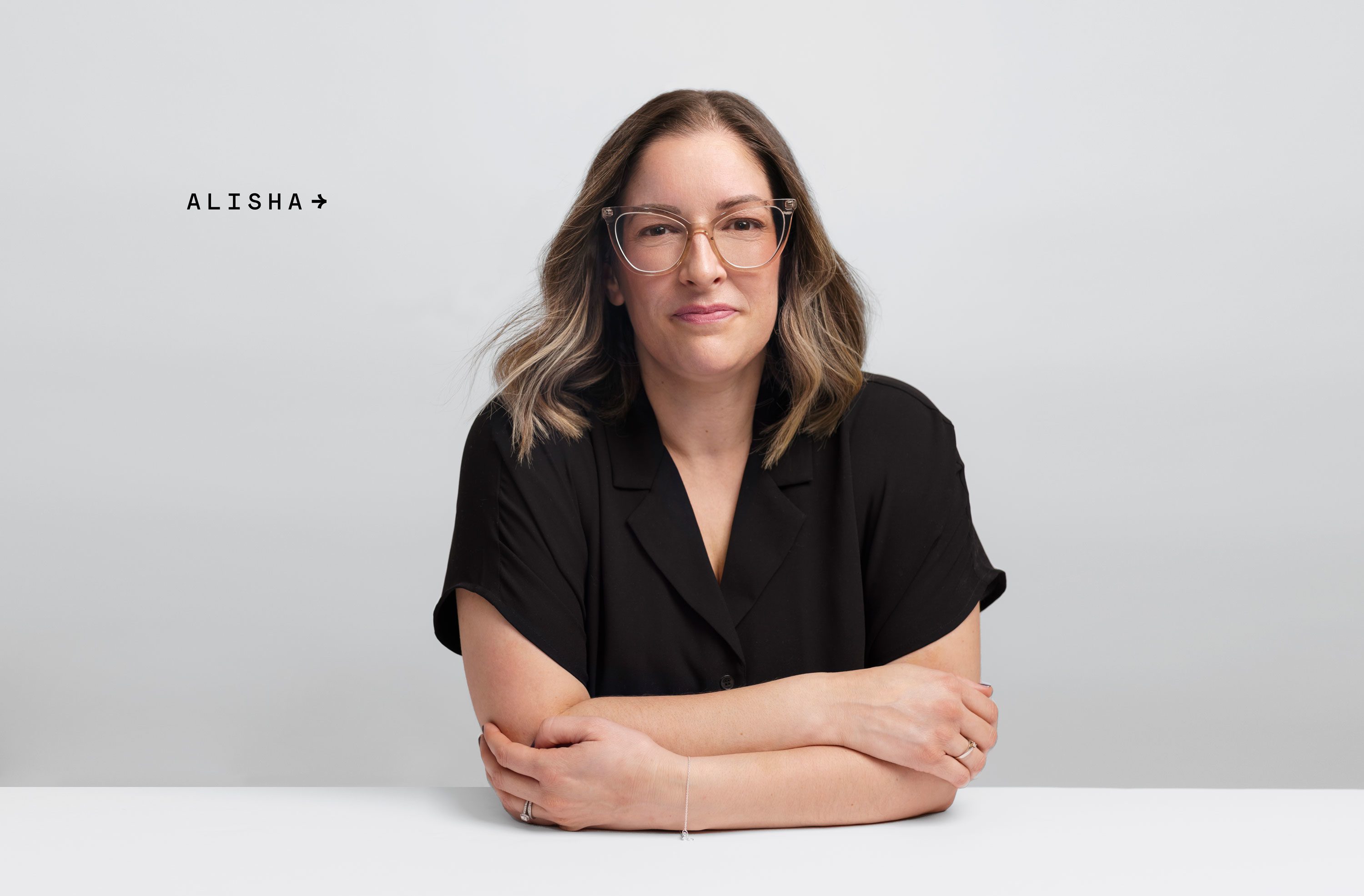
But things kept going south. Over the next four years, we went through six rounds of IUI. We also tried four rounds of in-vitro fertilization, where the egg and sperm are fertilized in a lab before being inserted into the uterus. We tried a few variations of IVF. I did two natural cycles, where you don’t take as many medications but you have to go to the clinic a lot more often. I needed to go for an ultrasound every second day for a week. When I was close to ovulation, I had to go in every day. I also tried two medicated cycles, where I took more hormones. They made my ovulation schedule more predictable, which allowed me to reduce my visits to the clinic.
The cost of the treatments added up: each round of IUI set us back around $1,000 while the four rounds of IVF cost about $10,000. I don’t think people realize how exhausting fertility treatments are. Each round of IUI and IVF takes about a month, and if IVF is unsuccessful, you need to spend weeks building up your hormone levels through daily injections until you can try again. The hormones mess with your body: I was bloated and had brutal cramps. On top of it all, I was working 12-hour shifts as a nurse at Princess Margaret Cancer Centre’s leukemia clinic. Some days, I’d finish my night shift at 7:30 a.m. and go straight to the fertility clinic to see the doctor and get bloodwork and an ultrasound before going home mid-morning to sleep. I was physically and mentally exhausted.
Kyle was devastated too, so it was hard for us to support each other in the way we needed. It’s almost like we had a system: grieve, don’t think about it for a while, then find the courage to try again. People would ask me if I was okay, and my answer was always, “I’m not okay; Kyle isn’t okay; but, together, we are managing.”
Related: On the front lines of Toronto’s booming, semi-legal surrogacy market
Kyle: The process was incredibly challenging for me, and for Alisha it was a lot worse. I remember being home on the couch on weekends, trying to help her cope, trying to distract myself, and nothing was working. It was hard to be strong when I could see her suffering. It felt like, once we recovered from one failed attempt, we’d just try again and repeat the disappointment. It became scheduled agony. Then we blinked and a few years had passed.
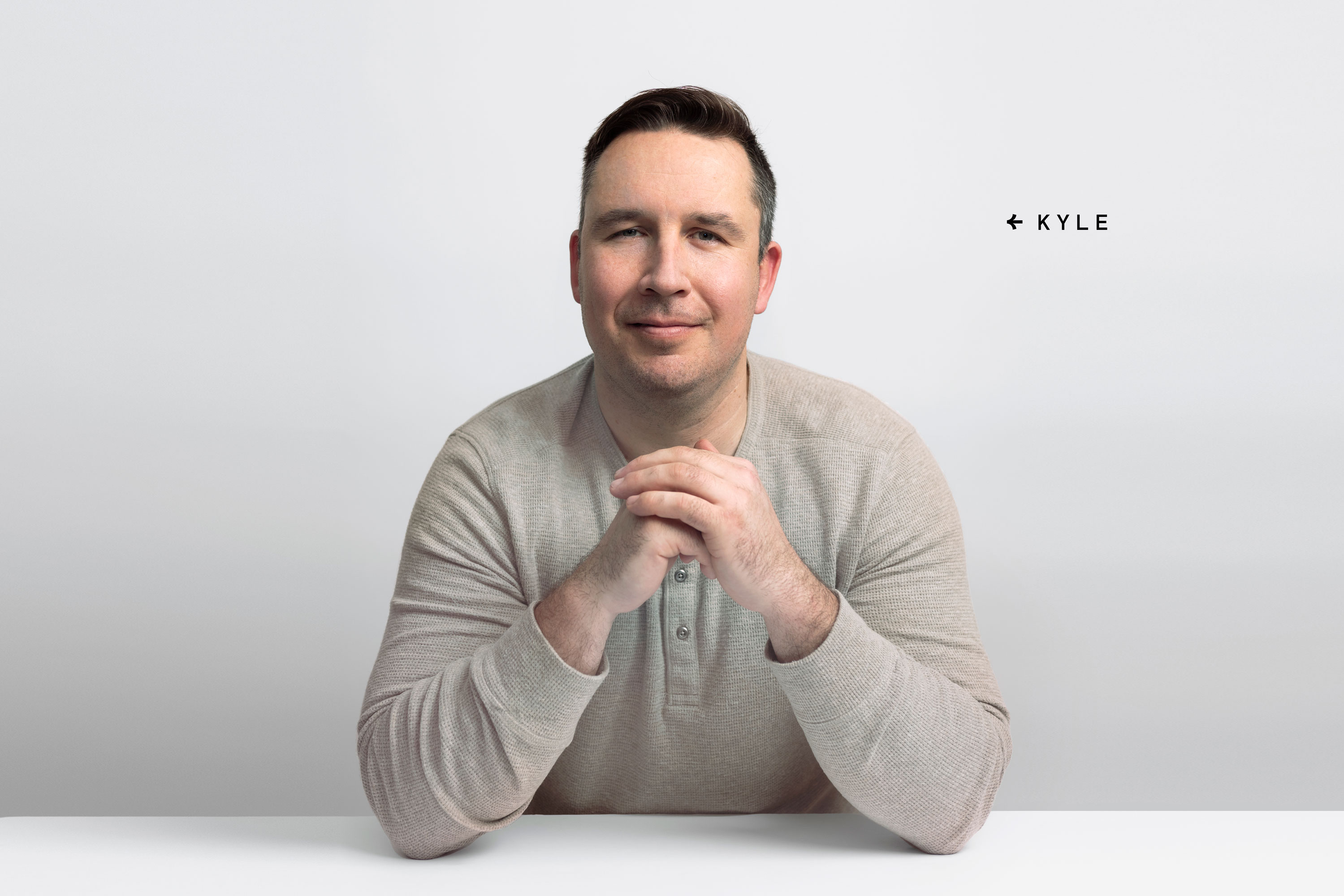
Alisha: Nobody could really tell me why I couldn’t get pregnant. Doctors were optimistic and told me, “Your embryos are good and your lining looks fine.” Then they would give me one drug or another to try, the most common being progesterone and estrogen. I also took Clomid, Fragmin, Aspirin, steroids and antibiotics. I even had a platelet-rich plasma infusion to help increase the thickness of my uterine lining. I get that fertility is a fairly new area of medicine, but I felt like we were just throwing things at the wall and waiting for something to stick. My medical chart was as thick as a phonebook.
In fall 2019, Kyle had a procedure done to increase his sperm count. It worked, and I became pregnant naturally in May 2020, but then I miscarried later that month. I got pregnant again in October only to miscarry yet again in November.
Despite everything we’d been through, we didn’t want to give up on becoming parents, and we figured we’d give the fertility treatments one last try. I took time off work from December 2020 to February 2021 to be as rested as possible. We had two embryos left. We tried twice; neither attempt was successful. It seemed like we were out of options.
The math hit me: out of 10 rounds of treatment, I had gotten pregnant only that very first time. I was devastated by all of these failed trials and miscarriages. I felt like a shell of my former self—I was in a fog, going through the motions of my daily routine. My mental state had become so fragile that every time I’d go to a fertility clinic, my heart rate would spike and I’d feel myself getting angry. I was on the verge of tears each time I walked out of there, and I struggled to set those feelings aside at home and at work. And the pandemic made everything worse because Kyle couldn’t come to the appointments with me.
At that point, doing the same thing over and over again and expecting a different outcome seemed ridiculous. We appealed to our doctor for other suggestions, and she asked if we had considered adoption or surrogacy.
I had looked into adoption, and it sounded daunting: private adoption can cost up to $30,000, and public adoption involves jumping through quite a few hoops. Plus, we would never know when—or if—we would be approved or selected to adopt a child.
“The cost of the treatments added up: each round of IUI set us back around $1,000 while the four rounds of IVF cost about $10,000”
Kyle: I wasn’t 100 per cent on board with adoption. It can be wonderful for some people, but it made me feel like I had failed somehow. I thought that, as a man, my number-one job in pregnancy was to make sperm that would create life. Once I realized that the pregnancies were maybe not successful due to an issue on my end—and, because of that, we would have to give up on our dream of raising our own biological child—it was a little demeaning. I didn’t want to stop trying.
Alisha: I agreed with him. I had always imagined myself carrying a child in my belly. But, by then, I had mourned the loss of a full-term pregnancy and accepted that I would never feel a baby kick, experience childbirth or breastfeed. I also wasn’t keen on trying to get pregnant for another five years, and I was willing to give those dreams up if it meant we could have a family. So I leaned toward surrogacy: at least, with that route, the child would be biologically ours.
Kyle: Alisha convinced me, and I got on board with surrogacy. We hadn’t invested five years of our lives toward the goal of being parents just to quit.
Alisha: Once we agreed to try surrogacy, Kyle looked at me and asked, “What if, by the time we find a surrogate, you’re also pregnant?” I said, “Well, I guess we’ll just have two babies” and chuckled to myself. After so many years of failed attempts, that possibility sounded like a fantasy.
In April 2021, we started looking for a surrogate mother. I knew exactly where to start. The year before, when I’d mentioned our fertility problems to a friend, she had graciously volunteered to be our surrogate. Though I was grateful for her offer, I was in no headspace to consider it at the time. Now that we were looking, I texted her and asked if her offer still stood. She was completely open to it.
Kyle and I were touched. The idea that someone would put their body through a full pregnancy to help us was so selfless. But things muddied when our friend went to her ob-gyn for an assessment. The doctor warned that, because our friend had already given birth twice by C-section, the surrogacy would be risky for her and the baby. Then, in August, while we were trying to figure out what to do, I received a call from my good friend Jess.
Jess: I’ve known Alisha since we were kids. We went to the same daycare, and we were in elementary school and competitive dance groups together. Until recently, we played in the same kickball league. Our husbands work at the same construction company, and the four of us regularly get together for Thanksgiving feasts, pumpkin carving on Halloween and Christmas dinners. Alisha is one of the few people I’ve kept in touch with for my whole life, and I knew she had struggled for a long time to get pregnant.
I had been lucky on that front: I have two boys who were at that point 12 and 10, and both pregnancies had gone so well that I enjoyed them. I didn’t have any side effects like morning sickness, mood swings or fatigue, and the deliveries were smooth. I remembered it as a rewarding, amazing experience. So, while my partner, Sam, and I were not planning to have more kids ourselves, the idea of being pregnant again appealed to me.
Then, one day, a work colleague who was going through IVF treatment said, “I just wish I could have a surrogate,” and a light bulb went on. I thought that maybe I could be a surrogate, and maybe I could do it for Alisha. I had read that only about 400 surrogate mothers give birth in Canada each year, and I thought, There is a demand for this, giving birth is easy for me and I have a chance to help a friend.
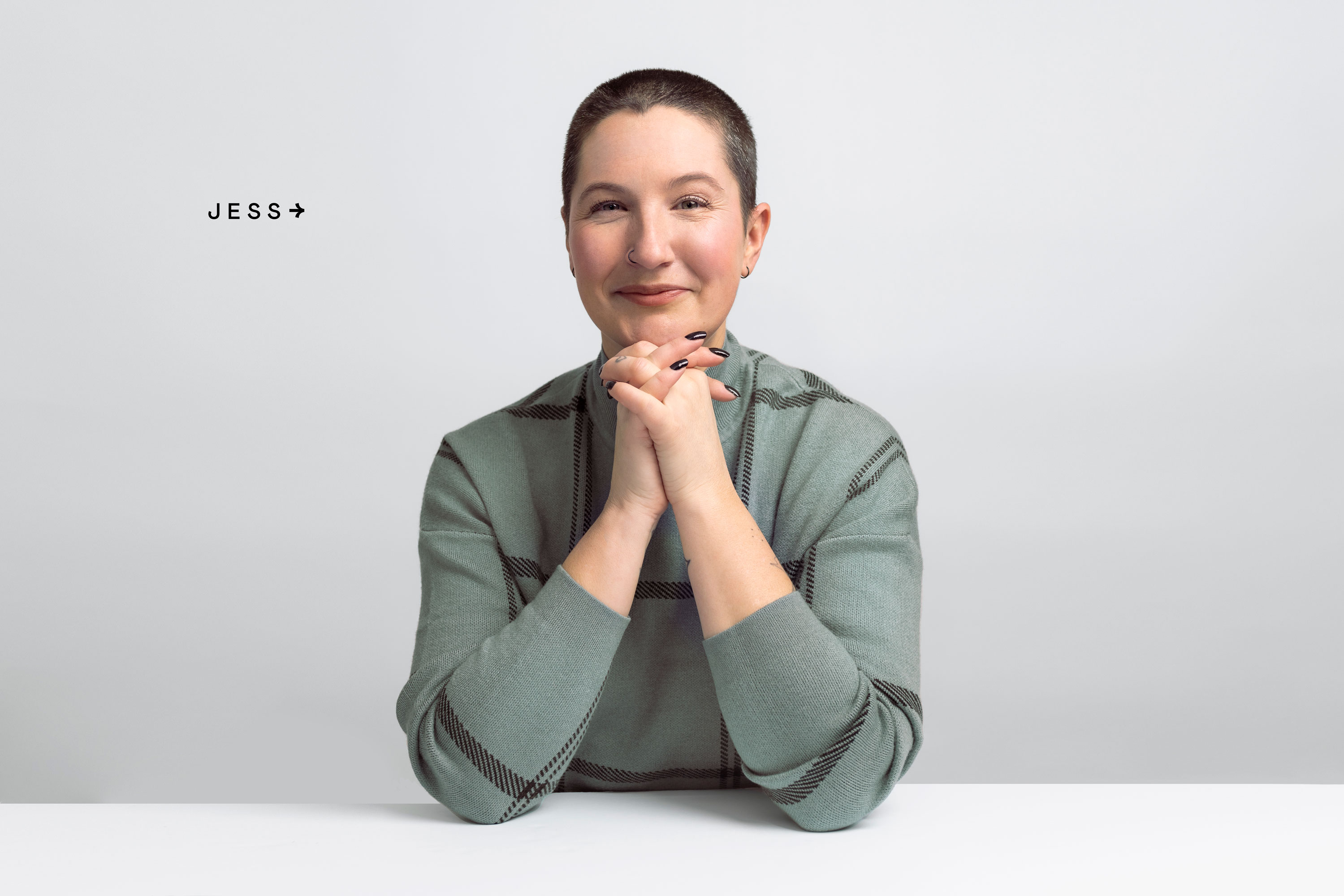
Sam: I was immediately supportive. Ultimately, it was Jess’s decision, and I knew how much she enjoyed pregnancy and childbirth. I had some minor concerns about potential health issues for Jess, but I had confidence in her instincts.
Jess: I decided to call Alisha and see if she was looking, but then I hesitated. How are you supposed to offer something like that? I had no idea where her head was at after all of her fertility treatments. Maybe the offer would upset her. One night, I finally got the courage to pick up the phone and said, “Hey, I’m so sorry if this is awkward or offends you, but I could be your surrogate, if you’re looking. I like being pregnant, I’m good at it and you guys deserve this.”
Alisha: I started crying. I couldn’t believe it—the timing couldn’t have been more perfect. I love and trust Jess very much. It felt like a good sign. We told our other friend that we had found someone who would be lower risk, and Kyle and I started to plan the pregnancy out with Jess and Sam. From then on, we were a team of four.
Jess: In early October 2021, I went to the fertility clinic to meet with the doctor. I got an ultrasound to check the thickness of my uterus and bloodwork to check my hormone levels, and I started taking progesterone. A few weeks later, on November 8, the doctor transferred a frozen embryo containing Alisha’s egg and Kyle’s sperm into me. Alisha was in the room with me, and we held hands.
Alisha: The doctor said we’d have to wait until the following Saturday—November 20—to find out if the transfer was successful. I texted Jess to say that I couldn’t wait until Saturday, and she said she couldn’t either. So Kyle and I went over to Jess and Sam’s on Tuesday night with a pregnancy test for Jess. My period was two days late, and I joked with Jess that I should take a test too. We were all so nervous.
Jess: I thought I was going to throw up.
Alisha: But Jess’s test was positive! We were so excited—we were finally going to be parents. Two days later, I still hadn’t had my period. I was leaving a night shift and shuffling around outside of a Shoppers Drug Mart, wondering if I should get my hopes up and take a test. I had gone through this before: realizing my period was late, driving over to a pharmacy and getting my period hours later. Yet, despite past disappointments, it was hard not to get excited. So I called Kyle to ask him if I was crazy in thinking I might be pregnant. I was going back and forth, telling him, “I want to take a test…but I shouldn’t take a test…but I need to take a test!”
Kyle: I was starting my work day and about to go into a meeting. I could sense that she was excited, almost giddy, and I told her that taking a test couldn’t hurt.
Alisha: I bought a new pregnancy kit, went home, peed on the stick and waited. I checked and saw a little plus sign. I looked away and told myself, Okay, regroup, you’re just seeing things. But, when I looked down again, it was undeniably positive. I started bawling. Between happy sobs, I called Kyle.
Kyle: Alisha was screaming that she was pregnant, and I started howling. It was a mix of happiness, shock, anxiety—everything. Then, after a few seconds, the emotion in Alisha’s voice was gone.
Alisha: I was excited for two minutes, but then dread and fear took over. The what-ifs started creeping in: What if we miscarry? And what if we’re too busy grieving to enjoy the beautiful thing Jess is doing for us? What is she going to think when I call her and say, Hey, you know that amazing sacrifice you’re making for us? Well, now I’m pregnant anyway.
Kyle: It was a weird feeling to navigate, but at least we both felt it. Later that night, I said to Alisha, “Okay, we can’t just anticipate a bad outcome, because we’ll be crushed before anything bad even happens. All we can do is force ourselves to be hopeful and, as surreal as it feels, prepare to have two kids.”
Alisha: We invited Jess and Sam over for dinner a few days later and put two envelopes in front of them.
Jess: The first one contained a lovely message thanking me for being their surrogate. Then, on the second envelope, it said, “Open second, and buckle up.”
Alisha: Inside were two of my positive pregnancy tests. I was so nervous. I looked at Jess, not sure whether I should smile, and she just started giggling and then all-out laughing.
Jess: I was so happy for her. Of course now of all times is when it happens!
Sam: We’d seen first-hand how much bad news they’d had to endure. It was so great to see them finally share something positive.
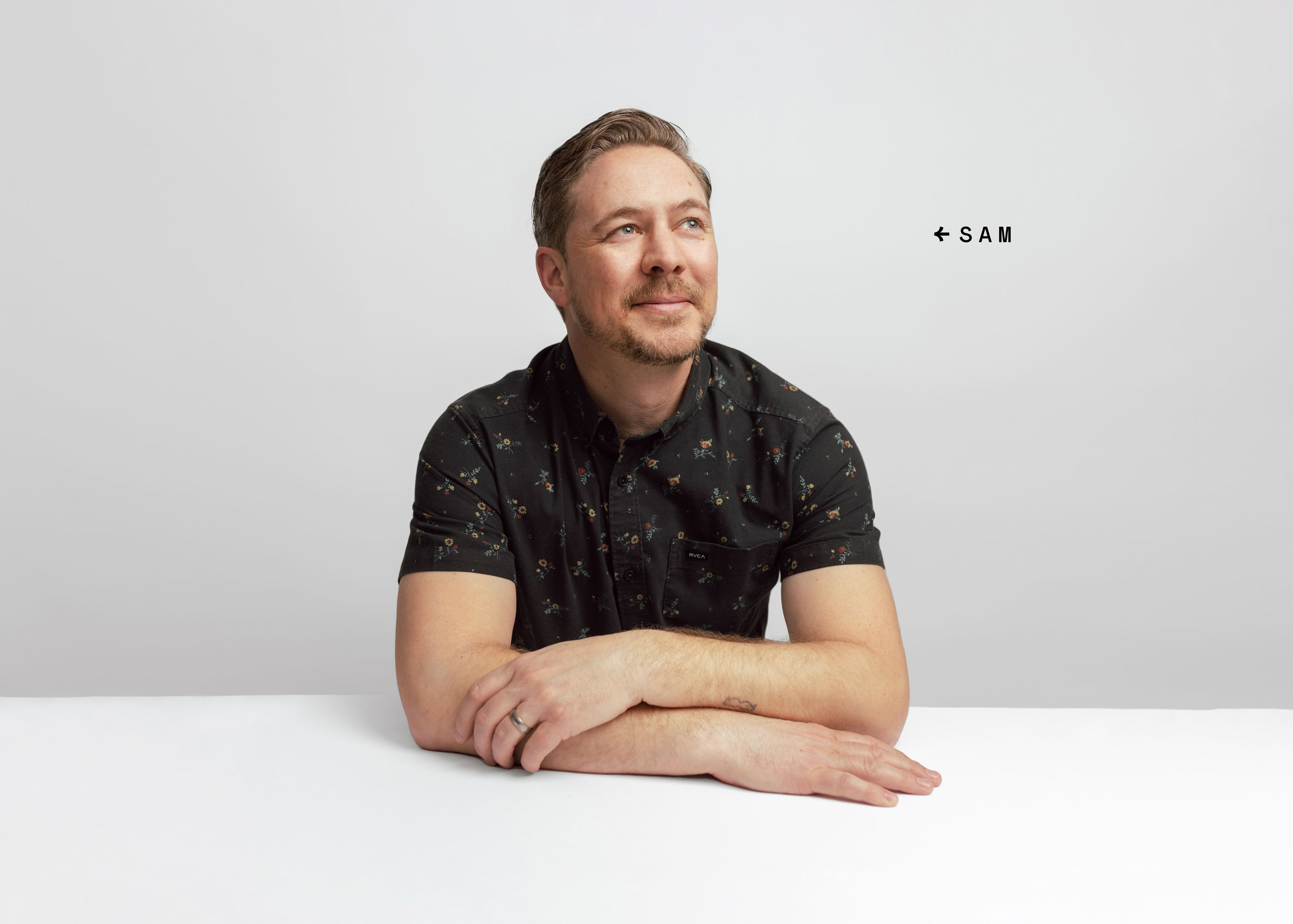
Related: How I learned the horrifying truth about my biological father
Alisha: We had a great time with Sam and Jess, and by the end of the night, I was on a cloud. But, no matter how hard I tried to keep the negative feelings at bay, they would resurface every few days: I’m going to miscarry, and I’m going to be too busy mourning my baby to enjoy our pregnancy with Jess. I was angry at myself for thinking that way, but when you’ve lost four babies, it’s hard to stay positive.
And yet the weeks passed without the usual bad news. I lived through the joys of early pregnancy: seeing a little bump grow, then telling my family and friends, which Jess and I did together. We were at a Pictionary night with friends, and I drew two pregnant women with an arrow pointing to me and an arrow pointing to Jess. One of Jess’s sisters looked at us and asked, “Oh my god…are you both pregnant?”
At the 20-week ultrasound, everything was still looking good, and it started sinking in that this pregnancy would not be like the rest. At 22 weeks, we felt the baby kick for the first time. Then we got to 24 weeks—the point at which a fetus can theoretically survive outside of a uterus—and that was another huge milestone. We learned that I was carrying a girl and that Jess was carrying a boy. I thought, It’s really happening. We’re having two kids: one of each!
From there, things moved quickly. In early June, Kyle and I went to a Blue Jays game with Jess, Sam and Jess’s sister Adelle. Afterward, we went out for a bite. I was 32 weeks pregnant but still feeling energized, having some laughs. When Kyle and I got back home, I watched TV for an hour. When I stood up to go to bed, my water broke.
Kyle and I looked at each other, shocked and worried. I was eight weeks early. I called our midwife and asked her what we should do. She told us to rush to the hospital. We drove as fast as we could to Michael Garron. I wasn’t having contractions, but they admitted me right away.
The doctor told me the plan was to delay labour for as long as possible so that the baby’s lungs could mature. To do that, they injected me with a drug called nifedipine. They also gave me blood thinners and put me on modified bed rest, which meant I could walk the length of the hallway but no farther.
Those were my next six days: very pregnant with nowhere to go, by turns excited, bored and nervous. I read a book on hypnobirthing to prepare myself for delivery, watched The Office and Stranger Things, and scrolled through endless lists of baby names.
Then, on June 6, at 33 weeks, I went into labour. The delivery was more intense than I’d anticipated. Because of the blood thinners, I wasn’t allowed an epidural, which would increase my risk of internal bleeding. As sore as I was, I thought about how much we wanted this. We’d chosen a name the night before: Daphne.
We barely had a moment with her. Because she was premature, Daphne was rushed to the neonatal intensive care unit, and she stayed there for almost three weeks of care and observation. During that time, we developed a routine: Kyle would visit her before work for her 6 a.m. feeding, and I would go for the 9 a.m. feeding and stay until the early afternoon. Then we would both go back to the hospital for Daphne’s 6 p.m. and 9 p.m. feedings. I wasn’t breastfeeding her—she had to be tube and bottle fed. But we wanted to be there for skin-to-skin contact and the occasional bottle feeding and just to spend time with her. She would sleep a lot while I watched her. We were reassured that her stay was part of the process, but I still walked out of there in tears.
We finally brought her home at the end of June, and it was so special. I had wanted to experience that moment for so long. But we couldn’t rest: for a few weeks, we were new parents and expecting parents at the same time. I wanted to turn some of my attention over to Jess, even though she felt certain that her delivery would be less eventful.
“I checked and saw a little plus sign. I looked away and told myself, Okay, regroup, you’re just seeing things. But, when I looked down again, it was undeniably positive”
Jess: Because my two previous pregnancies had been so smooth, I assumed that this one would also be problem-free. I was wrong. I had morning sickness every day, and the ultrasounds showed that the baby’s head size was in the 99th percentile. Because of his size, the doctors wanted to get him out before his due date.
I was admitted to Mount Sinai and induced six weeks after Daphne’s birth, on a Friday at 4 p.m. I was on an oxytocin drip to get my cervix to dilate enough to avoid a C-section.
Alisha: That’s when Kyle and I arrived. We rushed in to see Jess, and the doctors told us that she was dilating quickly and the birth might happen at any second. We were so nervous about missing it.
Jess: But then, shortly after Alisha and Kyle arrived, I stopped dilating at eight centimetres—barely big enough to give birth. I was stalled there for eight hours, until doctors started telling me to push. Even though I’d had an epidural, I said, “I don’t know if I can do this without a C-section,” but they were delaying it, encouraging me by saying, “Jess, you can do this!” After 45 minutes of pushing, they realized we had no other choice. Alisha came with me to the operating room while Kyle and Sam waited in the birthing room.
Waiting for surgery was surreal. I was naked in a freezing room while doctors were tossing warm blankets over me and upping the intensity of my epidural. I was totally numb. The doctors said, “You will feel some pressure,” and I was like, “Really? Nope, not feeling anything.” They could have cut off my legs and I wouldn’t have known. Then, after a few minutes, I started to convulse—a rare side effect of an epidural. I felt so uncomfortable. Through chattering teeth, my whole body shaking, I tried telling Alisha, “I’m okay—don’t worry about what you are seeing!”
Alisha: I was so nervous for her. I thought, What if something goes wrong? Would we be to blame? I had not prepared myself to see anything like this.
The doctors assured me that things were going to plan. The convulsions slowed, and Jess gave birth to Frederick Leigh at eight pounds and 10 ounces—big, but not the monster baby they’d made him out to be. He shares a middle name with Jess.
Jess: As soon as Freddy was here, the doctors rolled me into a separate room, where Sam and Kyle were waiting. I was still convulsing on and off.
Sam: It was such a weird thing to see. She would fall asleep for a minute, then wake up and blurt out something like “How is the baby?” or “Where is Alisha?” and then fall back to sleep. We were scared at first, but once we saw that she was going to be fine, her outbursts just became funny. She had been awake for 36 hours, so of course she was exhausted.
Jess: At one point I blurted out that the kids’ names are an unintentional tribute to Scooby Doo—something I probably wouldn’t have said if I hadn’t been half-delirious.
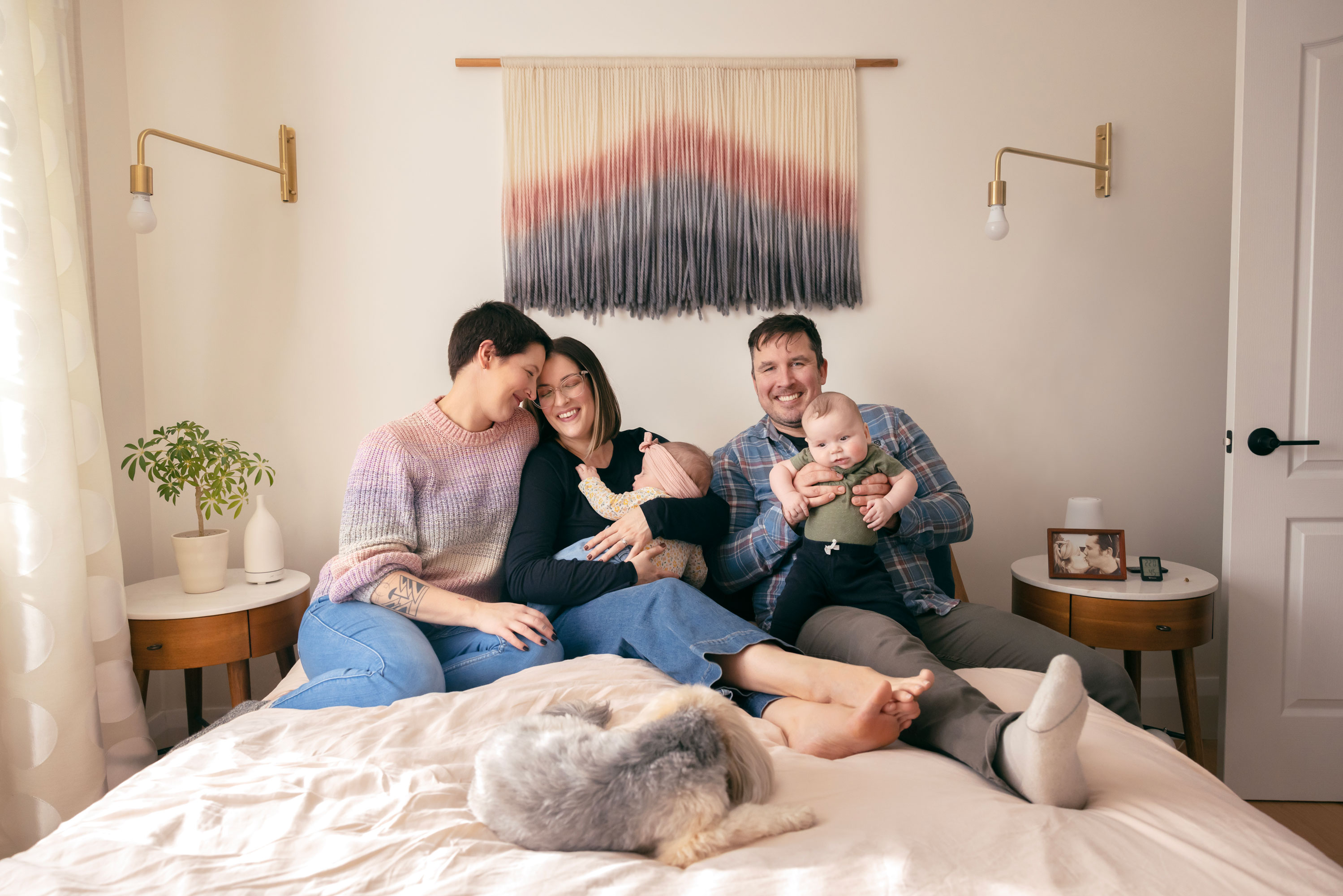
Alisha: Despite how chaotic and unpredictable this process was, the result was beautiful. The babies are healthy, they eat and sleep well, and they’re just starting to poke at each other when we lay them down together.
Kyle: Some people ask us if we got more than we bargained for—if having two babies instead of one is too busy. The answer is absolutely not: this is what we wanted. Whether we are dealing with bad moods or poopy diapers, none of it feels negative. It’s all part of the journey that we had wanted to embark on for so long. Oddly enough, those five tough years were also part of the journey. But, eventually, they’ll come to feel like just a weird blip in time. The result overpowers all of the struggles.
Alisha: Yes, it was traumatic at times, but that isn’t something we want to forget—it’s a reminder of how lucky we are now. Plus, it brought Sam and Jess into our lives in an even more meaningful way than before. Jess comes over frequently to see the babies. It feels right to have her around. We did all of our ultrasounds, midwife appointments and then our deliveries together, and this past year has brought us so much closer. I feel like I had my own pregnancy coach.
Jess: I hope I’ve been able to provide wisdom and support along the way. It was also helpful that we were hitting milestones and experiencing pregnancy symptoms at the same time. If I had any advice for Alisha through it all, it was to take things one moment at a time, and that holds true from pregnancy to parenthood. I’m so happy she gets to have the experience she longed for—she’s a great mother.
Alisha: We’ll both be in the children’s lives. We will do a friends’ dinner once a month, and Jess and Sam will get to see the kids a lot. But I’m the mom…
Jess: …and I’m Aunty Jess. I’m like, I baked you, and then I sent you home with your mommy!
Alisha: That’s how we might explain it to the kids. Eventually, once they realize that their birthdays are different and they aren’t actually twins, we’ll tell them their origin story. It’ll be a beautiful thing to convey: We wanted you so badly that this is what we were willing to do, and our wonderful friend was in it with us.
This story appears in the March 2023 issue of Toronto Life magazine. To subscribe for just $39.99 a year, click here. To purchase single issues, click here.





